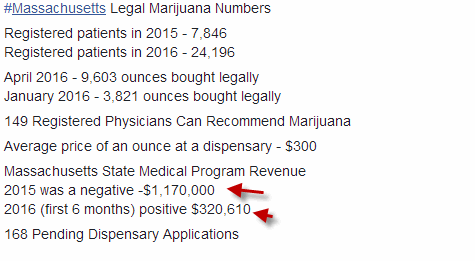3 Facts You Should Know About The Changes To Cannabis Legalization In Massachusetts
Lawmakers in Massachusetts seem to have agreed on changes to cannabis legalization laws within the state. Referred to as the compromise bill, the measure was proposed to the House of Representatives on Monday. According to the Boston Globe, the bill is expected to pass for the approval of Governor Charlie Baker.
The bill was expected to be passed by the end of June, a year before recreational cannabis dispensaries will officially become legal in Massachusetts. But lawmakers wanted to immediately address the changes between the House and Senate bills, because the House bills were only greeted by resistance among pro-cannabis legalization advocates.

Here’s what you need to know about the proposed changes on the new bill:
- Bans on cannabis establishments: One of the main differences in the bill was deciding if cities and towns could have the liberty to impose a local ban on cannabis establishments, including shops, dispensaries, and other cannabis establishments. According to the original law, which mirrors the Senate bill, the local ban was permitted only if majority of the residents voted for it. A provision in the House bill, which was supported by Baker, would have allowed local-elected officials the liberty of banning cannabis businesses in their communities no matter what local voters say.
In the new bill, the decision to ban cannabis shops would be based on how a certain town voted on the cannabis ballot question during the elections last November 2016. If the popular vote was anti-legalization, then the local officials would be able to decide on any bans. The Boston Globe features an infographic on which towns voted for or against cannabis legalization, although 72% of the population voted for it. Despite the compromise bill, legal experts think that it might be an unconstitutional move since they think it disregards equal treatment for Massachusetts citizens. According to Thomas O. Bean, a local attorney: “Think about the larger issue,” he says. “The legislature passes a law that has one provision for one set of cities and towns, and a different provision for another set of cities and towns, based on a vote that no one took.”
- Cannabis tax: Based on votes last November, the ceiling cannabis tax which includes the local 6.25% sales tax was set at 12%. This tax rate is somewhat low, especially when you compare it to other states where cannabis is legal recreationally. Gov. Baker, among others, are concerned that the low tax rates might not be adequate to fund the costs involved with managing the new market.
The House bill proposed to increase the cannabis tax up to 28%; however, the Senate bill doesn’t include any changes. In the compromise bill, lawmakers met in the middle by agreeing that the proposed cannabis tax should be set at 20%. Legalization advocates warn that if the tax rate is too high, it would encourage black market transactions just so that people could get access to cannabis. According to Baker, he would support the 20% tax rate, if it was enough to cover the costs needed.
- Regulations: The measure voted for last November called for the creation of a state regulatory board, which is the Cannabis Control Commission (CCC). The state treasurer, Deb Goldberg, would be responsible for appointing the CCC’s 3 members.
The CCC is given the responsibility to decide on the new cannabis rules, including marketing regulations, measures for equal opportunity in the cannabis market, growing, labeling, and even defining what the penalties would be for any violations. Both Senate and House bills changed the CCC to make it a board of 5 persons, where the attorney general and governor would also have the ability to appoint members. The compromise bill agrees with the 5-person regulatory board, which is already being followed by the 5-person regulatory board that oversees casino gambling.

In summary, the compromise bill seems to please legalization advocates. “The law passed by voters was well-crafted and required no alteration,” said Matthew Schweich, the director of state campaigns for the national Marijuana Policy Project. “However, we respect the need for compromise,” he adds, “and while we don’t approve of every provision in this bill, we are satisfied that the outcome will serve the interests of Massachusetts residents and allow the Commonwealth to displace the unregulated marijuana market with a system of taxation and regulation”.
We’ll have to wait for the end of this week to see if Baker approves.
OTHER STORIES YOU MAY ENJOY...
MARIJUANA PIZZAS ARE SELLING FAST, CLICK HERE.







